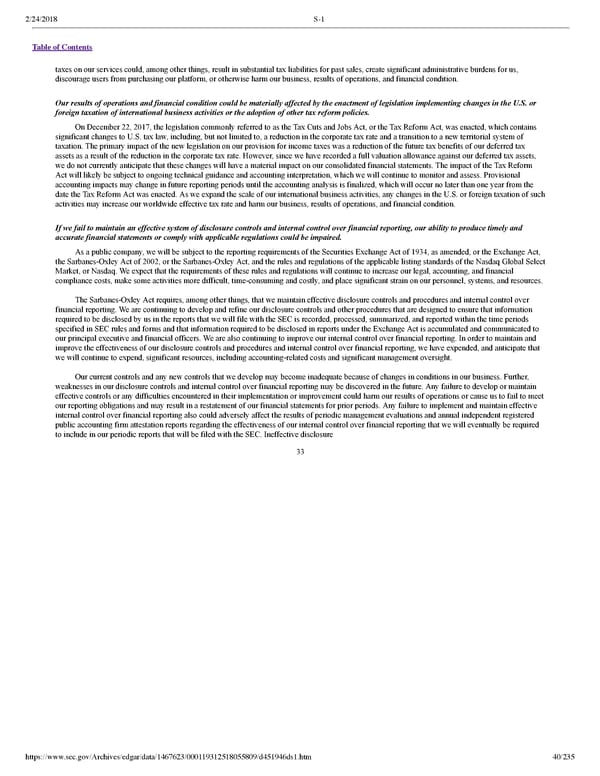2/24/2018 S-1 Table of Contents taxes on our services could, among other things, result in substantial tax liabilities for past sales, create significant administrative burdens for us, discourage users from purchasing our platform, or otherwise harm our business, results of operations, and financial condition. Our results of operations and financial condition could be materially affected by the enactment of legislation implementing changes in the U.S. or foreign taxation of international business activities or the adoption of other tax reform policies. On December 22, 2017, the legislation commonly referred to as the Tax Cuts and Jobs Act, or the Tax Reform Act, was enacted, which contains significant changes to U.S. tax law, including, but not limited to, a reduction in the corporate tax rate and a transition to a new territorial system of taxation. The primary impact of the new legislation on our provision for income taxes was a reduction of the future tax benefits of our deferred tax assets as a result of the reduction in the corporate tax rate. However, since we have recorded a full valuation allowance against our deferred tax assets, we do not currently anticipate that these changes will have a material impact on our consolidated financial statements. The impact of the Tax Reform Act will likely be subject to ongoing technical guidance and accounting interpretation, which we will continue to monitor and assess. Provisional accounting impacts may change in future reporting periods until the accounting analysis is finalized, which will occur no later than one year from the date the Tax Reform Act was enacted. As we expand the scale of our international business activities, any changes in the U.S. or foreign taxation of such activities may increase our worldwide effective tax rate and harm our business, results of operations, and financial condition. If we fail to maintain an effective system of disclosure controls and internal control over financial reporting, our ability to produce timely and accurate financial statements or comply with applicable regulations could be impaired. As a public company, we will be subject to the reporting requirements of the Securities Exchange Act of 1934, as amended, or the Exchange Act, the SarbanesOxley Act of 2002, or the SarbanesOxley Act, and the rules and regulations of the applicable listing standards of the Nasdaq Global Select Market, or Nasdaq. We expect that the requirements of these rules and regulations will continue to increase our legal, accounting, and financial compliance costs, make some activities more difficult, timeconsuming and costly, and place significant strain on our personnel, systems, and resources. The SarbanesOxley Act requires, among other things, that we maintain effective disclosure controls and procedures and internal control over financial reporting. We are continuing to develop and refine our disclosure controls and other procedures that are designed to ensure that information required to be disclosed by us in the reports that we will file with the SEC is recorded, processed, summarized, and reported within the time periods specified in SEC rules and forms and that information required to be disclosed in reports under the Exchange Act is accumulated and communicated to our principal executive and financial officers. We are also continuing to improve our internal control over financial reporting. In order to maintain and improve the effectiveness of our disclosure controls and procedures and internal control over financial reporting, we have expended, and anticipate that we will continue to expend, significant resources, including accountingrelated costs and significant management oversight. Our current controls and any new controls that we develop may become inadequate because of changes in conditions in our business. Further, weaknesses in our disclosure controls and internal control over financial reporting may be discovered in the future. Any failure to develop or maintain effective controls or any difficulties encountered in their implementation or improvement could harm our results of operations or cause us to fail to meet our reporting obligations and may result in a restatement of our financial statements for prior periods. Any failure to implement and maintain effective internal control over financial reporting also could adversely affect the results of periodic management evaluations and annual independent registered public accounting firm attestation reports regarding the effectiveness of our internal control over financial reporting that we will eventually be required to include in our periodic reports that will be filed with the SEC. Ineffective disclosure 33 https://www.sec.gov/Archives/edgar/data/1467623/000119312518055809/d451946ds1.htm 40/235
 Dropbox S-1 | Interactive Prospectus Page 39 Page 41
Dropbox S-1 | Interactive Prospectus Page 39 Page 41